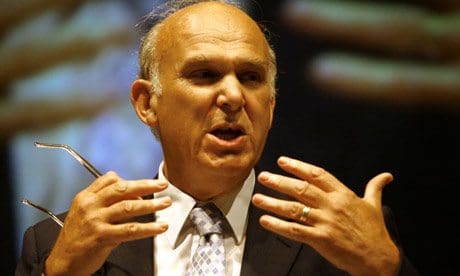Cable, a long-term critic of Britain’s large banks, said the government needed to focus on ensuring a 100 billion pound ($155 billion) credit boost announced in June reached companies that needed loans to fund their expansion, reports UK Reuters.
“Our leading banks are frankly throttling recovery by not making business lending available, particularly to small-scale companies,” Cable told BBC television.
“That is where the real problem is, we now have to focus single mindedly on that task, how to make sure that the additional money gets into British business,” he added.
Britain’s largest banks are Barclays, Lloyds (LLOY.L), Royal Bank of Scotland (RBS.L), HSBC (HSBA.L) and Santander (SAN.MC).
The country fell back into recession at the turn of this year, adding to pressure on the coalition government to come up with new ways to boost growth.
Cable said he had been visiting “super” companies in the north of England. “(They) have got big export potential, got orders, and they just cannot get a loan from the bank to finance their exports and expansion. This is the issue we have to focus on.”
The Bank of England’s programme of quantitative easing, where it effectively prints money and buys government bonds in the hope of stimulating extra investment in the economy, was not working as well as it should, Cable said.
“Quantitative easing is necessary but not sufficient … There has been a breakdown in the mechanism, in the transmission, it just does not get through to companies,” he added.
To reduce the cost of bank funding and encourage more lending, the government said last month it would back 80 billion pounds of new loans, with the Bank also providing banks with 5 billion pound tranches of six-month liquidity.
A scandal over the rigging of a key interest rate has reignited public anger over banks in Britain, which people blame for sinking the economy into a recession from which the country is struggling to emerge.
Parliament this week agreed to open an inquiry into banking ethics after Barclays (BARC.L) paid a 450 million pound fine over the manipulation of the London Interbank Offered Rate (Libor), sparking fierce criticism of its culture and risk-taking.
Cable said banks were holding back the growth of British industry because of “their existing culture, which is frankly anti-business, obsession with short-term trading profits, not focusing on the long-term.”
Banks, which are under pressure to rebuild their balance sheets following the 2007-09 financial crisis, say many companies are reluctant to borrow money in an uncertain economic climate.
Cable was sympathetic to a proposal floated by Labour opposition leader Ed Miliband on Sunday for Britain’s big five banks to sell 1,000 local branches to create two new competitors on the high street.
“I want to see more competition. That’s a good idea,” Cable said.
The government is already encouraging more entrants to the British banking market, and plans a radical shakeup of the sector, requiring banks to ring-fence their high-risk investment operations from their retail operations.


